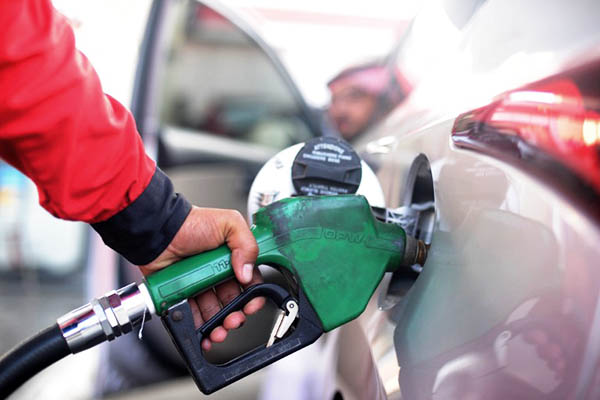
Amer Hilabi—AFP
Finance Minister Miftah Ismail late on Wednesday night announced the government is raising the prices of petroleum products by removing all subsidies in a bid to curb the prevailing economic crisis and secure much-needed support from the International Monetary Fund (IMF).
This is the third price hike of petroleum products since May 26, when the government had announced a Rs. 30 increase to all prices. That was followed by a second hike on June 2, which Ismail had warned was still insufficient, as the government was still providing hefty subsidies on diesel and a relatively minor subsidy on petrol.
The new prices of fuel products are Rs. 233.89/liter for petrol, up from Rs. 209.86/liter; Rs. 263.31/liter for diesel, up from Rs. 204.15; Rs. 211.43/liter for kerosene oil, up from Rs. 178.31; and Rs. 207.47/liter for light diesel oil, up from Rs. 181.94. Overall, in less than a month, the prices of diesel have gone up by 83 percent; petrol by 56 percent; kerosene by 73 percent; and light-diesel oil by 68.4 percent.
In his press conference, Ismail—who was joined by Minister of State for Petroleum Musadik Malik—warned that the price increase was inevitable “to save the country from default.” Stressing that this had been a “difficult” decision, he admitted that it would provoke a new round of inflation and add to the burden on the citizenry, especially the impoverished. However, he emphasized, the incumbent government had no choice but to remove subsidies and pass the full burden onto the consumer due to the deals signed by the ousted PTI-led government and the prevailing global market conditions.
While noting that prices had now been brought to levels where there was no government subsidy on the sale of petroleum products, he said he was hopeful this would help convince the IMF to revive the much-needed bailout program that had been suspended earlier this year. However, he refused to confirm or deny that this would be the last such price hike, saying simply that he could not promise what he was not aware of.
Reiterating that this was a truly difficult decision for both Prime Minister Shehbaz Sharif and himself, he hoped it would help curtail the continuous slide of the Pakistani rupee against the U.S. dollar; stabilize the stock exchange; and improve investor confidence in the government’s commitment to economic reform.
Noting that the subsidy announced by former prime minister Imran Khan had been causing monthly losses of Rs. 120 billion to the government—compared to the Rs. 42 billion monthly expenditure of running the entire civil government—he lamented that he had not seen such “devastation in the economy” in the past 30 years.
In a bid to reduce the burden being imposed on the common man, the finance minister said the government was already providing Rs. 2,000 to eight million households under the Benazir Income Support Program this month, and would increase this support to six million more families in the next fiscal year.
Petroleum minister Musadik Malik, meanwhile, said that the previous government had left behind a circular debt of Rs. 1.4 trillion in the gas sector and Rs. 162 billion in LNG diversion to the domestic sector. “We have taken responsibility to take corrective measures and we will not pass blame and will take responsibility for our decisions,” he stressed. “Global oil prices are out of our control but I promise the day international crude prices come down to $110 or 105, I will come back to you and announce a price cut,” Ismail added.
To a question, Malik said he realized that Rs. 2000 was “nothing,” but said it would help the most impoverished meet some of the shortfall in their household budget. Ismail added that four million people had sought information in the past few weeks on whether they qualified for this financial help, noting it “at least” provided some relief.
In a series of posts on Twitter on Thursday morning, P.M. Shehbaz Sharif said he would “soon” take the nation into confidence on the specifics of the deal between the IMF and the previous government that had prompted the decision to hike all petroleum prices. “Acutely aware of the impact that a fuel price hike causes,” he said. “Government is left with no choice but to raise the prices due to IMF deal that PTI government signed,” he said, adding that the incumbent government would steer the country out of the prevailing economic difficulties.
“I wonder whether those who struck the worst ever deal with IMF and took patently bad economic decisions have the conscience to face the truth,” he wrote. “How can they pretend to be innocent when what the nation is going through is clearly their doing?”
